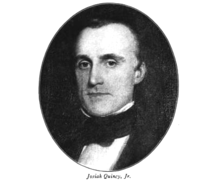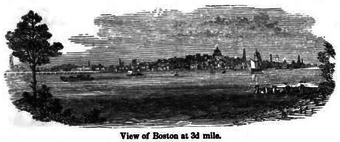Josiah Quincy Jr.
Josiah Quincy IV (/ˈkwɪnzi/; January 17, 1802 – November 2, 1882)[1] was an American politician. He was mayor of Boston (December 11, 1845 – January 1, 1849), as was his father Josiah Quincy III (mayor in 1823–1828) and grandson Josiah Quincy VI (mayor in 1895–1899).
Josiah Quincy IV | |
|---|---|
 | |
| 11th Mayor of Boston, Massachusetts | |
| In office December 11, 1845 – January 1, 1849 | |
| Preceded by | Thomas A. Davis |
| Succeeded by | John P. Bigelow |
| Personal details | |
| Born | January 17, 1802 Boston, Massachusetts |
| Died | November 2, 1882 (aged 80) Boston, Massachusetts |
| Political party | Whig |
| Occupation | Politician |
| Mayor Davis died on November 22, 1845. Benson Leavitt, Chairman of the Board of Aldermen served as Acting Mayor from November 22, 1845 to December 11, 1845. After Quincy was elected Mayor on December 8, 1845 for the term beginning January 5, 1846, Quincy was appointed by the city council as acting mayor on December 11, 1845 to serve out Mayor Davis' term. | |
Career
He attended Philips' Academy, Andover and graduated from Harvard College in 1821.
He was elected a member of the Ancient and Honorable Artillery Company of Massachusetts in 1823 and became its captain in 1829 at the age of 27.
He was the author of Figures of the Past (1883).[2]
As a member of the Massachusetts State Legislature in 1837, he was instrumental in the establishment of the Massachusetts Board of Education. He built the Josiah Quincy Mansion in 1848.[3]
He was elected to the Boston City Council in 1833 and served as its president from 1834 to 1857.
He served as mayor of Boston from 1845 to 1849. He served as treasurer of the Boston Athenaeum from 1837 to 1852.
Family

His brother Edmund (1808–1877) was a prominent abolitionist, and author of the biography of his father and of a romance, Wensley (1854). A sister, Anna Cabot Lowell Quincy Waterston, was a writer; and another sister, Eliza Susan (1798–1884) was her father's secretary and the biographer of her mother.[2]
Quincy had two sons — Josiah Phillips (1829–1910), a lawyer, who wrote, besides some verse, The Protection of Majorities (1876) and Double Taxation in Massachusetts (1889); and Samuel Miller (1833–1887), who practised law, wrote on legal subjects, served in the Union army during the Civil War, and was breveted brigadier-general of volunteers in 1865. [2]
A descendant of his, through her mother, was Helen Howe, novelist.
See also
- 63rd Massachusetts General Court (1842)
- Timeline of Boston, 1840s
Sources
- William Guild, Description of the Boston and Worcester and Western Railroads: In which is Noted the Towns, Villages, Station, Bridges, Viaducts, Tunnels, Cuttings, Embankments, Gradients, &c., the Scenery and Its Natural History, and Other Objects Passed by this Line of Railway. With Numerous Illustrations, Boston?: Bradbury & Guild, 1847, p. 13.
References
- "Josiah Quincy Jr. - Boston Mayor from 1846 to 1848". Celebrateboston.com. Retrieved 2012-07-01.
- Chisholm 1911.
- Pepe, William J.; Elaine A. Pepe (2008). Postcard History Series: Quincy. Arcadia Publishing. p. 72.
- Attribution
![]()
External links
- Modern Eloquence: Vol III, After-Dinner Speeches P-Z at Project Gutenberg, contains Quincy's speech of welcome to Boston for Charles Dickens.
| Political offices | ||
|---|---|---|
| Preceded by Thomas Aspinwall Davis Benson Leavitt (acting) |
Mayor of Boston, Massachusetts 1846–1848 |
Succeeded by John P. Bigelow |